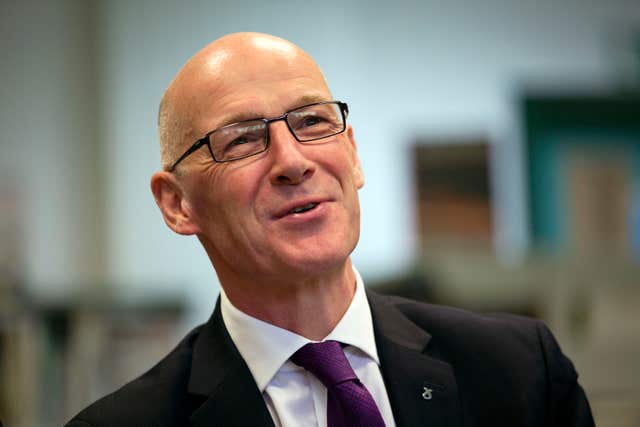
Education Secretary John Swinney has urged all local authorities across Scotland to provide free music tuition for pupils.
During a debate held by Holyrood’s Education Committee on Tuesday, Mr Swinney said although decisions over how to deploy resources were a matter for councils, the Scottish Government was committed to working with partners to preserve and enhance instrumental music tuition in Scotland.
The committee published its report on the question of instrumental tuition for pupils earlier this year, concluding it should be provided free of charge.

Although some councils such as Glasgow City and Edinburgh City provide free tuition for pupils, others have either introduced or raised charges.
It has coincided with a decline in the number of pupils in the country opting to learn a musical instrument in schools.
Mr Swinney said: “The expressive arts are of great importance to Scotland’s culture and to our economy.
“Participation in music and the arts can have a hugely positive effect on our children, our young people and on their families.
“Being involved in music and the arts provides children and young people with opportunities to be creative, to develop their imaginations and to experience inspiration and enjoyment.
“This can have a hugely significant positive effect on their mental, emotional, social and physical well-being.
“Instrumental music tuition in schools is an important element of that participation in the arts.”
Mr Swinney said he shared the concerns of young people and parents over any reduction in the “quality and reach” of instrumental music services in any part of Scotland.
These are trying times for school music services, with cuts rising and charges reaching unprecedented levels. We are urging decision makers to #changethetune https://t.co/nF1NIDlasx pic.twitter.com/spKvpv5L48
— EIS (@EISUnion) April 29, 2019
The Deputy First Minister said local government had been treated fairly in the financial settlements put in place by the Scottish Government and pointed to a number of local authorities, including Glasgow and Edinburgh, that have continued to provide instrumental music tuition free of charge.
He said: “Choices are made at local level by individual local authorities.
“It is up to each local authority to decide how it deploys the resources that are available to it and I would take this opportunity to encourage local authorities to provide instrumental music tuition to pupils within their locality at no cost to the pupils involved.”
Mr Swinney said while the Scottish Government would continue to respect for the autonomy of local authorities, he said it is committed to working collaboratively to maintain instrumental music tuition in Scotland.
He added that following discussions last year, a working group on the issue secured a commitment from local government umbrella body Cosla to set a minimum standard of eligibility criteria for access to free music tuition.
Those eligible would include those in receipt of free school meals, as well as those undertaking SQA qualifications (which is already a current standard).
Scottish Conservative MSP Liz Smith said: “Music in whatever capacity should be at the very heart of any curriculum, not just because of the educational and social benefits that it brings but because it has the potential to transform lives.”
Scottish Labour’s education spokesman Iain Gray pointed to cuts to core council budgets as a factor affecting the provision of free music tuition.
He said: “We cannot ignore simply the financial circumstances which councils find themselves.
“Core council budgets have decreased in real terms by £1.64 billion since 2011-12.
“The only possible way to fix the current postcode lottery of access to instrument tuition is to once again provide proper, adequate core funding overall for our local councils.”


House Rules
We do not moderate comments, but we expect readers to adhere to certain rules in the interests of open and accountable debate.
Read the rules here